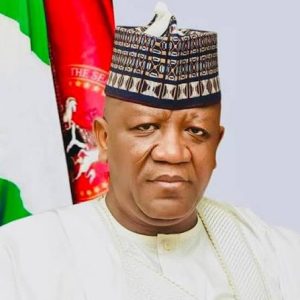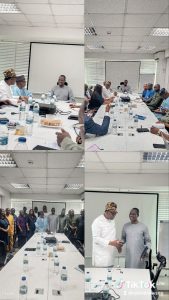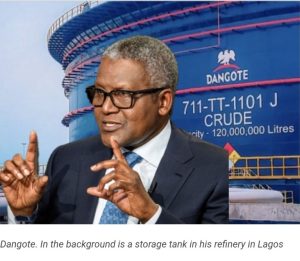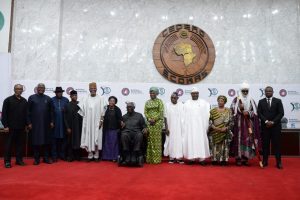The Siege On OML 42: Inside the Suspicious Legal Frenzy Targeting Nestoil and Neconde
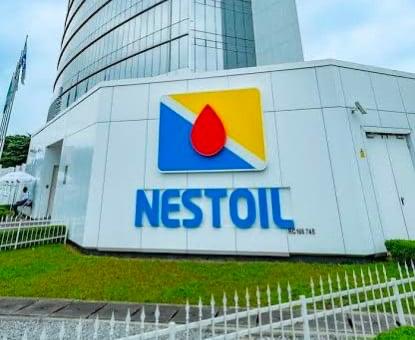
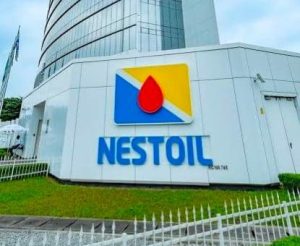
……Ex parte orders freeze billions in assets as oil firms fight to protect operations
……The High-Stakes Battle Threatening to Upend Nigeria’s Indigenous Oil Industry
…….How sweeping court orders, foreign lenders, and judicial petitions collide over Nigeria’s oilfields.
On quiet days, OML 42 lies like a wounded giant in the swamps of the Niger Delta; its pipelines humming with the memory of once-roaring production, politics, and crude. But in recent weeks, the oilfield has become the epicentre of a legal hurricane so fierce it has shaken boardrooms from Lagos to London, and rattled confidence in Nigeria’s frail petroleum economy.
At the heart of this storm sits Nestoil Limited, Neconde Energy, and a constellation of lenders, judges, lawyers, regulators, and petitioners, each tugging at the arteries of an oilfield that once fed the nation’s treasury with imperial largesse. What began as a debt recovery move has spiralled into a sprawling legal drama, punctuated by allegations of judicial overreach, claims of corporate suffocation, bitter accusations of suppressed facts, and fears that the country may unwittingly precipitate another indigenous-industry crisis.
This is the story of how sweeping ex parte orders froze billion-dollar assets, halted oil production, provoked foreign lenders, drew petitions to the Chief Judge, and threatened to trigger a corporate collapse with implications far beyond any courtroom.
In late October 2025, a single judicial order—stark, sweeping, and delivered without the presence of those it sought to bind—sent shockwaves through Nigeria’s oil sector. By November, the aftershocks had morphed into a full-blown institutional confrontation, forcing a federal judge to step back from his own case, foreign lenders to rush to court in defence of their security interests, and industry watchers to whisper fears of a clandestine attempt to seize control of OML 42 through judicial means.
It began with an ex parte motion filed on October 20, 2025. By October 22, Justice Dehinde Dipeolu of the Federal High Court, Lagos, had granted what lawyers now describe as one of the broadest Mareva injunctions in recent corporate memory. The orders froze the bank accounts, shares, and assets of Nestoil Limited, Neconde Energy Limited, and their various affiliates, effectively paralysing a corporate group with tentacles across engineering, energy, and upstream petroleum.
The plaintiffs, FBNQuest Merchant Bank and First Trustees, claimed the companies owed them over $1.01 billion and N430 billion, figures the defendants insist are unverified, untested, and inflated. Without hearing from the other side, the court restrained every known account, every operation, every flow of funds. The order swept through commercial banks like a winter storm, locking signatories out of platforms and freezing transactions mid-stream.
But the gale did not stop there. The ex parte ruling also empowered a receiver/manager to seize assets and allegedly authorised the Nigerian Navy and the DSS to enforce the civil orders—an action critics say violates the preservative nature of interim injunctions and dangerously militarises commercial disputes.
For Neconde, the operator of OML 42, the effect was immediate and brutal: oil production—about 40,000 barrels per day—collapsed overnight.
NECONDE: “We do not owe a kobo”
Stunned, Neconde accused the plaintiffs of dragging it into a debt dispute to which it was neither a borrower nor a guarantor. The company maintained it is not indebted under the syndicated loan that formed the basis of the plaintiffs’ claims.
But more critically, Neconde argued that it is already under winding-up proceedings in another division of the Federal High Court (Suit No. FHC/CP/1439/2025), which means—under the Companies and Allied Matters Act (CAMA) 2020—no new litigation, property disposition, or enforcement action can proceed against it without explicit leave of court.
By law, any such action is “null, void, and of no effect.”
The company insisted the ex parte order was issued in patent disregard of this statutory shield.
Neconde’s lawyers went further: the company’s inclusion in the Mareva orders, they said, amounted to “judicial overreach,” a “wrongful interference with third-party rights,” and a crippling disruption that halted crude production, threatened contractual obligations with the Federal Government, and imperilled national revenue.
Foreign lenders fight back
If the legal tremors had been contained within Nigerian banking circles, the matter might have remained a domestic skirmish. But the moment foreign lenders appeared in court—powerful institutions whose credit lines form the backbone of Nigeria’s indigenous upstream investments—the temperature of the dispute changed dramatically.
Glencore Energy UK Limited, Fidelity Bank Plc, Mauritius Commercial Bank Limited, and the Africa Finance Corporation descended upon the courtroom like seasoned custodians of global finance, determined to protect their stake in a $640 million syndicated facility extended to Neconde nearly a decade earlier. Represented by Olufemi Oyewole, SAN, they made it clear that the sweeping ex parte orders did more than freeze accounts, they struck at the very foundation of the international financing that sustains local participation in oil production.
Their argument was thought-provoking. They warned that the plaintiffs had obtained the orders by concealing the existence of the syndicated facility, a senior loan secured years before and buttressed by a carefully constructed chain of security documents. By failing to disclose this hierarchy of interests, the plaintiffs had, in effect, invited the court to upend an entire financial ecosystem built on the principles of priority ranking and transparent disclosure.
Even more troubling, they said, was the invocation of a Deed of Charge registered solely against Nestoil, not Neconde, whose assets and operations now lay entangled in the freeze. The Deed, they noted, was explicitly subordinate to the Senior Lenders’ security documents, making the plaintiffs’ attempt to enforce priority rights both defective and dangerous. With Neconde’s accounts frozen, the company could not service its obligations, raising the spectre of cascading defaults, cross-liability earthquakes, and potential insolvency.
In the cool legal language of the courtroom, the lenders warned that Nigeria was courting reputational harm. In the more practical terrain of oilfields and pipelines, the message was even starker: international lenders would not sit idly as their security interests were jeopardised by a hasty judicial order that ignored the fundamentals of secured lending.
The senior creditors asked to be joined as defendants and urged the court to set aside the ex parte orders altogether. Their intervention cast the dispute in a new light—no longer merely a quarrel between a Nigerian bank and a Nigerian conglomerate, but a battle that now implicated the trustworthiness of Nigeria’s judicial and financial environment.
Petitions, accusations, and a halted proceeding
Even as legal arguments multiplied, another, more explosive front opened. Petitions began arriving at the office of the Chief Judge of the Federal High Court and the National Judicial Council. Their allegations were unflinching and accusatory. Justice Dehinde Dipeolu, the man whose pen had frozen a billion dollars in corporate activity, now found himself accused of judicial excess and procedural recklessness.
The petitioners claimed that the judge had granted sweeping receivership and freezing orders without confirming the ownership of several assets, including the towering Nestoil edifice in Victoria Island—an iconic structure allegedly belonging to parties not indebted to the plaintiffs. They accused him of issuing orders against Neconde despite its ongoing winding-up proceedings, which should have placed the company under statutory protection from exactly such actions. Even more disturbing to the petitioners was the allegation that the judge had authorised the involvement of the Nigerian Navy and DSS in enforcing civil receivership orders, and had permitted the sale of crude oil from OML 42 under an interim injunction that should, by definition, preserve rather than dispose of assets.
These were not mere procedural objections; they were allegations that cut at the heart of judicial impartiality and commercial fairness. By the time the case returned to court on November 7, 2025, the atmosphere was heavy with distrust and institutional tension. Justice Dipeolu disclosed that he had received the petitions and, in the interest of propriety, suspended further proceedings pending the directive of the Chief Judge on whether he should continue or recuse himself.
What had begun as a debt-recovery application was now a full-blown crisis implicating the integrity of the court itself.
As petitions swirled and lenders fought to protect their stakes, Nestoil, Neconde, and their sister companies mounted a vigorous counteroffensive of their own, one that framed the plaintiffs’ actions as a calculated ambush built on half-truths and withheld information.
They argued that the plaintiffs had suppressed critical facts, chief among them a Common Terms Agreement executed in December 2022. Under this agreement, the existing debts had been fully restructured and a fresh repayment framework established, stretching over ten years from December 2021 to 2031. By ignoring this restructuring—and launching a lawsuit instead—the plaintiffs, the defendants contended, had violated the very instrument governing the loan and breached the dispute resolution obligations contained within it.
The defendants insisted that the ex parte order lacked the urgency required for such intrusive relief. The debts had been restructured, negotiations were ongoing, and the plaintiffs had raised no credible risk of dissipation of assets. There was, in their view, no justification for freezing operations or immobilising assets so drastically.
They further complained that FBNQuest had refused, for over three years, to provide accounts that would allow a proper reconciliation. Without such statements, they argued, the plaintiffs’ claims were impossible to verify and likely inflated with charges that could not withstand scrutiny. Only a forensic audit could reveal the truth.
Regarding Nestoil Tower, the defendants described it as a permanent, immovable landmark, an iconic structure whose sheer stability rendered the freezing order unnecessary and disproportionate. The plaintiffs, they alleged, aimed to seize the property not for preservation but for strategic advantage.
Then there was the question of the receiver. The defendants asserted that the individual appointed by the plaintiffs lacked registration with the Corporate Affairs Commission, making the appointment legally defective under the Companies and Allied Matters Act. To them, the entire exercise reeked of desperation, haste, and a desire to secure through court orders what could not be obtained through lawful negotiation.
The cumulative effect of the ex parte orders, they warned, was nothing short of catastrophic: crippled operations, paralysed management, frozen personal accounts of directors, and a total collapse in Neconde’s oil production. Worse still, they said, the impact would be felt by the Federal Government itself, which depended on OML 42’s output for revenue.
Danger looming over Nigeria’s oil industry
Beyond the courthouse steps and the flurry of legal motions, a deeper anxiety pulsed through industry circles. OML 42 is not just another asset on a corporate balance sheet; it is a storied oilfield that once stood among the proudest in Nigeria’s portfolio, producing nearly a quarter of a million barrels per day in the 1970s.
A prolonged disruption in its operations would not only cripple Neconde, but reverberate through the entire upstream sector. Foreign investors—already wary of regulatory uncertainty—would see a fresh warning sign: that a single ex parte order, delivered without hearing from affected parties, could shutter a producing oilfield overnight. Such a perception could trigger capital flight and discourage indigenous operators from seeking the financing needed to participate meaningfully in the sector.
Nigeria, already battling declining production, pipeline vandalism, and divestments from international oil companies, could scarcely afford another shock. Yet this legal debacle threatened to become exactly that: a slow-motion blow to investor confidence and a stark reminder of how fragile indigenous oil investments remain in the face of judicial unpredictability.
Amid the drama, a darker, more conspiratorial suspicion persists that the entire legal drama was a sophisticated attempt to orchestrate a covert takeover of OML 42. The breadth of the ex parte orders, the attempt to enforce through military agencies, the alleged push to sell crude under a receivership arrangement, the disregard of winding-up protections, and the sweeping paralysis imposed on accounts all fed this suspicion.
It was not the first time Nigeria had seen corporate wars waged through interim injunctions and hurried receiverships. Nor would it be the first time that a prized national asset became the battleground for power plays disguised as litigation. Whether true or not, the speculation reflected the lingering mistrust that shadows high-value commercial disputes in Nigeria.
Now, the case rests in a tense pause, suspended pending the directive of the Chief Judge. Every party watches closely, aware that the decision, whether Justice Dipeolu continues or steps aside, will shape the trajectory of the dispute.
For Nestoil and Neconde, this is a struggle for corporate survival.
For the senior lenders, it is a defence of the principles that anchor international credit markets.
For the Nigerian judiciary, it is a test of institutional integrity.
And for the country at large, it is a moment of reckoning: a test of whether the courts can balance urgency with fairness, creditor rights with operational realities, and judicial discretion with the economic health of a nation.
OML 42 lies quiet as this unfolds, its wells waiting, its pipelines still, like a sleeping colossus held in suspense by the uncertain rhythms of law and power. The storm is far from over, but the coming weeks will reveal whether the rule of law can steady the ship, or whether this dispute will become another cautionary tale in the turbulent saga of Nigeria’s oil industry.


